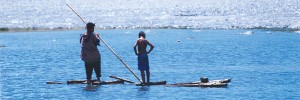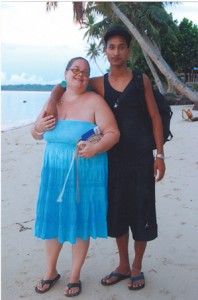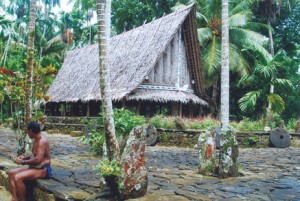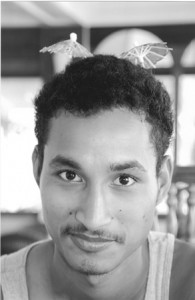 Growing up on the 38 square mile island of Yap, Sinclair Community College student Joseph Bandag said he never saw a Taco Bell or felt what it’s like to be cold until he came to the United States of America.
Growing up on the 38 square mile island of Yap, Sinclair Community College student Joseph Bandag said he never saw a Taco Bell or felt what it’s like to be cold until he came to the United States of America.
“When I was young I heard there were other countries around the world and that Earth was a big round planet,” Bandag said. “But I had never been anywhere besides Yap, so I thought they made some mistake and that Earth was just a flat thing that just goes and never ends. I thought that there was just Yap, the ocean and that’s it.”
Yap is located in the Western Pacific Ocean, northeast of New Guinea, and is a member of the Federated States of Micronesia. Bandag said he’d still be there if it wasn’t for complications with his wife’s pregnancy.
Pregnancy and preterm labor
Bandag met his wife, Molly, in 2003 when she was a volunteer for the United States Peace Corps.
 “She fell in love with the island when she was there, so when she was finished in the Peace Corps she came back to the island and started teaching,” he said. “She was my biology teacher and that’s how we got to know each other.”
“She fell in love with the island when she was there, so when she was finished in the Peace Corps she came back to the island and started teaching,” he said. “She was my biology teacher and that’s how we got to know each other.”
Bandag said he didn’t start dating his eventual wife until after he graduated high school and started attending classes at the College of Micronesia, which consists of three buildings, none more than two stories tall. Bandag said they tried for three years to have a baby before she finally became pregnant.
“She was 35 and her clock was ticking,” Bandag said. “She wanted to get pregnant before it was too late.”
Bandag said they left the island last fall when the hospitals in Yap couldn’t provide his wife the treatment she needed for her preterm labor, that begins more than three weeks before a woman is expected to deliver her baby.
“When she was in preterm labor and having pains every few minutes, (the hospital in Yap) was giving her some kind of morphine to ease her pain, but a day later they were out of stock,” Bandag said. “That’s when we had to call her mom and she booked us a flight (to the USA).”
Bandag said the only time he left the island previously was to visit his wife’s family in America last summer. He described the four-daylong plane trip as horrible.
He said that because Yap stays around 80 degrees year round, he had no winter clothes when he came to America.
“I’m still trying to get used to this cold weather,” Bandag said. “My skin is always dried up (and) my lips crust up. I got to put lotion on all the time.”
He added, “I don’t mind getting cold so long as I can see the snow. But being cold when there is no snow, I’m like pissed off. I’m like ‘Where’s the freaking snow at,’ he said while laughing.
Despite his distaste for the weather, Joseph said he likes America because his wife got the treatment she needed to give birth to a healthy baby girl via Cesarean section on Dec. 22.
“It was a very difficult birthing process,” he said. If we were back on the island I might have lost both of them.
He added, “I guess it’s a big responsibility (being a father), but things still feel the same for me. I have six sisters and three of them already have kids, so I’ve been taking care of babies all my life.”
Adjusting to the United States
 Bandag, Sinclair’s only Yapese student, said lifestyles in America and Yap are both similar and different.
Bandag, Sinclair’s only Yapese student, said lifestyles in America and Yap are both similar and different.
Because the Federated States of Micronesia is a sovereign state in free association with the United States, all Bandag had to do to transfer his Yapese driver’s license was take the written portion of the Ohio driving test. He said the first time he saw a street with more than two lanes was in America.
“I don’t like going on the highway,” he said. “On the island you can’t drive more than 40 mph. You drive more than that and your car is going to roll over because there’s turns every 50 feet.”
Another difference between Yap and the United States is the type of currency they use. Bandag said in Yap, they use large circular rocks called Rai Stones to show their wealth. He said the stones were brought to Yap from other neighboring islands by his ancestors and that some of the stones are more than six feet tall. The stones are used to buy land and are displayed in of front houses.
Bandag said some of Yap’s foods are bananas, coconuts, fish and imported turkey tail.
“You know when you get turkey there is no tail? The tail is being shipped back to Yap,” he said “You don’t see turkey in (Yapese) stores. There’s chicken and stuff, but no turkey, just turkey tails.”
Bandag said that because coffee is not available in Yap, most people chew betel nuts instead.
“People go out to the ocean and take corals, grind it up into powder, put it on the betel nut and wrap it in a peppery leaf,” he said. “It keeps you awake. Just one chew of that is like five cups of coffee.”
Bandag said a side effect of chewing betel nuts is that it discolors your teeth.
I’ve been chewing since I was eight so when we went to the dentist it took four hours (to get my teeth cleaned),” he said.
When Bandag isn’t in class or watching his daughter, he said one of his favorite activities is playing video games. He owned a Playstation 2 in Yap, but said the selection of games to choose from was limited. He said his sister, who is in the Army, bought him a Playstation 3 when she came to visit.
“I like Grand Theft Auto: San Andreas,” he said. “It was hard until I found out all the cheats.”
Future
After Bandag gets his degree in American Sign Language from Sinclair, he plans on moving back to Yap. He said his wife has a friend that may help set him up with an online job interpreting for the deaf.
“I miss my family and friends back in Yap,” he said “But I don’t miss the island.”
Joseph said he hopes to come back to America for vacations after he leaves.

